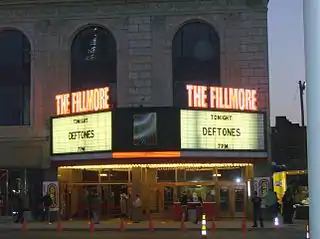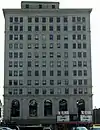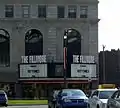The Fillmore Detroit
 Exterior view of the venue (c.2007) | |
| Former names | State Theatre (1925-37; 1982-89; 1991-2007)[1] Palms Theatre (1937-82) Clubland (1989-91)[2] |
|---|---|
| Address | 2115 Woodward Ave Detroit, MI 48201-3469 |
| Owner | Jim Forbes |
| Operator | Live Nation |
| Capacity | 2,900 |
| Construction | |
| Opened | October 29, 1925 |
| Renovated | 2007, 2018 |
| Reopened | June 13, 2007 |
| Website | |
| Venue Website | |
Francis Palms Building & State Theater | |
| Architect | C. Howard Crane |
| Architectural style | Beaux Arts |
| NRHP reference No. | 82000551[3] |
| Added to NRHP | November 24, 1982 |
The Fillmore Detroit is a multi-use entertainment venue operated by Live Nation. Built in 1925, the Fillmore Detroit was known for most of its history as the State Theatre. It is located near the larger Fox Theatre in the Detroit Theatre District along Woodward Avenue across from Comerica Park and Grand Circus Park. The Fillmore Detroit features a theatre with a Grand Lobby and three levels of seating, as well as the State Bar & Grill which has a separate entrance and is open when the theatre is not hosting events. The Detroit Music Awards are held annually at The Fillmore Detroit in April. The building was listed on the National Register of Historic Places in 1982.[3]
History
The site of the Fillmore was previously home to an earlier theatre known as the Central and then, from 1913-1923, as the Grand Circus Theatre. This theatre was demolished to make way for the 1925 construction of what was then called the Francis Palms Building.[4] The building was named for Francis Palms, a First French Empire native who moved to Detroit in 1832 and made his fortune in real estate development.[5] Palms' descendants continued in real estate as the Palms Realty Company,[6] and constructed this building at a time when Detroit's population and the popularity of movies was booming.
The theatre was constructed in 1925 as a movie house in the Renaissance Revival style of architecture. C. Howard Crane was the original architect, and the building is still called the Francis Palms Building.
The theatre was originally called the State Theatre when it opened in 1925. It was renamed the Palms-State Theatre in 1937 and the Palms Theatre in 1946. In 1982 it was renamed back to the State Theatre. And in 2007 (as a national re-branding) it was renamed, this time the Fillmore Theatre.
The building is twelve stories high and covered with terra cotta, with an eight-story auditorium extending to the rear of the building.[6] The office tower has elaborate Beaux-Arts Italian Renaissance decorations on all but the ground floor, which was modernized in about 1960.[6]
Current use
The Fillmore Detroit is a concert venue for popular music acts as well as hosting many special events. The venue's current seating capacity is 2,900, 2,084 for reserved seating. The mezzanine and balcony levels still contain their original theatre seating.
In March 2007, Live Nation announced that the State Theatre would become the Fillmore Detroit as part of a multi-city extension of the Fillmore brand, similar to what has been done previously with the House of Blues franchise. Various changes were implemented to evoke the Fillmore's iconic venue in San Francisco, California. The official inaugural show under the Fillmore Detroit re-branding was Fergie's June 13, 2007, performance.
Live Nation has continued the gradual restoration of the Italian Renaissance theatre. The outer lobby and rotunda lobby were restored in the 1990s. The grand foyer columns and auditorium proscenium arch were more recent restorations. Live Nation has restored the barrel vaulted ceiling of the three story grand foyer, and has plans to work on the upper reaches of the auditorium in increments.
American Idol
In 2015, the fourteenth season of American Idol held semi-finals at The Fillmore Detroit. Pre-recorded episodes were aired on Fox starting on February 25,[7] followed by two live episodes, the series' first broadcast from outside Los Angeles, on March 3 and 4.[8]
Gallery
 The Palms Building houses the Fillmore Detroit theatre
The Palms Building houses the Fillmore Detroit theatre The marquee extends over Woodward Avenue
The marquee extends over Woodward Avenue The Fillmore Detroit was known for most of its history as the State Theatre
The Fillmore Detroit was known for most of its history as the State Theatre
See also
References
- HistoricDetroit.org ~ Fillmore Detroit (old photos)
- HistoricDetroit.org ~ Fillmore Detroit by Dan Austin
- "National Register Information System". National Register of Historic Places. National Park Service. March 13, 2009.
- Austin, Dan. "The Fillmore Detroit". Historic Detroit. Retrieved August 1, 2014.
- State Theatre/ Francis Palms Building from Detroit1701
- Palms, Francis, Building and State Theater from the state of Michigan
- Moutzalias, Tanya (2015-02-20). "American Idol visits Detroit: Judges recognize Motown's influence on today's music". MLive. Retrieved 2022-06-26.
- McCollum, Brian (2015-03-04). "'American Idol' revels in Motown at the Fillmore Detroit". Detroit Free Press. Retrieved 2022-06-26.
Further reading
- Hauser, Michael & Marianne Weldon (2006). Detroit's Downtown Movie Palaces (Images of America). Arcadia Publishing. ISBN 0-7385-4102-8.
- Hill, Eric J. & John Gallagher (2002). AIA Detroit: The American Institute of Architects Guide to Detroit Architecture. Wayne State University Press. ISBN 0-8143-3120-3.
- Meyer, Katherine Mattingly and Martin C.P. McElroy with Introduction by W. Hawkins Ferry, Hon A.I.A. (1980). Detroit Architecture A.I.A. Guide Revised Edition. Wayne State University Press. ISBN 0-8143-1651-4.
{{cite book}}: CS1 maint: multiple names: authors list (link) - Sharoff, Robert (2005). American City: Detroit Architecture. Wayne State University Press. ISBN 0-8143-3270-6.
External links
- The Fillmore Detroit website
- Cinema Treasures website of old movie houses profiles The State Theatre.
- Fillmore Detroit Myspace Page
- Fillmore Detroit reopens after a summer of restoration — Detroit News, October 5, 2018
- Fillmore marquee to be completed this month, December 2018 — Detroit News, December 11, 2018



.svg.png.webp)